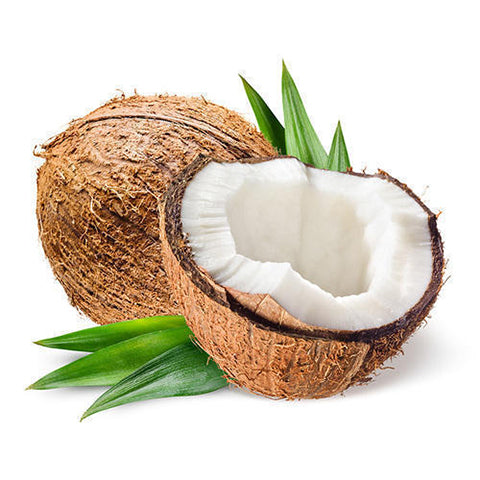Coconut MCT Oil

The Main Benefits Coconut MCT Oil May Assist With*:
- Promotes weight loss and fat burning
- Boosts metabolism
- Provides an instant source of energy
- Improves athletic performance
- Boost brain power and activity
- Powerful anti-fungal and anti-bacterial action
- Helps lowers the risk of heart disease
- Assist in blood sugar control
Scientific name
Medium Chain Triglycerides
What is The History of Coconut MCT Oil?
MCT Oil has recently become very popular amongst athletes and people wanting to lose weight, however, it has been studied and used in the medical field since the 1950’s. MCT oil is a fat and one of four ‘Functional Lipids’ – the others being waxes, phospholipids, and steroids/hormones. Researchers have found many health and cellular benefits for each of these lipids.
What are medium chain triglycerides (MCT)? They are a man-made fat consisting of carbon molecules, called triglycerides, linked together to form a chain. The length and composition of these triglycerides determines the class of fatty acid they fall into. Fats and lipids are broken down into 3 main classes –
Saturated fatty acids - made up of under 6 carbon molecules linked together to form a chain eg. Butyric acid (C4)
Medium chain fatty acids - made up of chains between 6 and 12 carbons long eg caproic acid (C6) and caprylic acid (C8)
Long chain fatty acids – made up of chains containing 12-20 carbon molecules eg olive oil (C17)
Due to MCT being a shorter molecule, they are easier to digest and have been used as an alternative food source for the sick, elderly or those that cannot digest fats or oils effectively.
MCT oil can be found naturally in coconuts, palm oil, and dairy milk products. Coconut is the preferred source to extract these MCTs as over 50% of the fats contained in coconut are between 6 and 12 carbons long.
There are 4 types of MCTs found in coconuts – C6, C8, C10 and C12. Of these four, the most research and studied are caprylic acid (C8) and capric acid (C10). Given the shortness of these fatty acids, they are broken down and absorb very quickly and go straight to the liver where they are converted to ketones and are not stored as fat. MCT oil also contains 10% less calories than long chain fatty acids making it the better fat choice in those wanting to lose weight.
Recognised Targets and Mechanisms of Action
Weight Loss and Thermogenic Activity
- Increases peptide YY and leptin that help reduce appetite and increase feelings of fullness
- Increase the body’s ability to burn fat and calories
- Increases energy expenditure and fat oxidation leading to a loss of visceral tissue
- Boosts fat burning and improves satiety to decrease body weight, waist circumference, hip circumference, total body fat, total subcutaneous fat, and visceral fat
- Helps maintain a ketogenic state of fat burning
- Shifts cells from global lipid anabolism to lipid catabolism and downregulates main de novo lipogenesis-activating transcription factors (Liver-X-receptor alpha and Sterol regulatory element binding protein-1), the lipogenic enzymes (ACC and FAS) and enzymes involved in fatty acid-uptake
- Decreases fat deposition without affecting whole-body protein content and assimilation
Cardiovascular Activity
- Reduces total cholesterol (TC) and low density lipoprotein (LDL-C) concentrations
- Reduces triglycerides (TG)
Brain Activity
- Bypasses a significant part of the brain glucose deficit and improves several cognitive outcomes in mild cognitive impairment (MCI)
- Substantial increase in total brain ketone metabolism (measured by PET scan)
- Cognitive scores in several tested domains improved in direct relation to the increase in plasma ketones and/or brain ketone uptake
- Increased astrocyte glycolysis, with the resulting lactate exported to neurons for fuel
- Increases ATP fuel production for brain cells
- improve cognition in patients with mild to moderate AD in apolipoprotein E4-negative patients
- Reduces seizures in epileptic people
Muscle and Metabolism Activity
- Enhances mitochondrial beta-oxidation and biogenesis, and increases mitochondrial respiratory capacity and lowers oxidative stress
- Increases energy expenditure by mediating the activation of the sympathetic nervous system
- Causes a transient rise in circulating ketones for several hours after consumption
- MCT suppresses the increase in blood lactate concentration and rate of perceived exertion (RPE) during moderate-intensity exercise and extends the duration of subsequent high-intensity exercise
Immunological Activity
- Optimises the growth of beneficial bacteria in the gut to build robust immune responses
- Helps heal the lining of the gut and lower inflammation
- Demonstrates strong growth inhibition of Clostridium difficile
- Strongly inhibits oral bacteria
- Has significant antimicrobial activity toward E. coli
- Inhibits both the mycelial and the yeast-form growth of Candida albicans
Anti-Diabetic Activity
- Helps reduce glucose concentrations in the blood
- Inhibits the amount of advanced end glycation products (AGEs) produced when cooking bread
- Reduces insulinotropic signalling and is associated with reduced inflammation and improved insulin sensitivity
- Shows a reduction in ceramides, sphingomyelin, and acylcarnitine (which have been implicated as mediators of insulin resistance and in the development of diabetic cardiomyopathy) and improves systolic function in subjects with T2D
- Increases insulin-mediated glucose metabolism in both diabetic patients and nondiabetic subjects
* These statements have not been evaluated by the FDA or TGA. This product is not intended to diagnose, treat, cure or prevent any disease.
Am J Clin Nutr. 1982 Apr;35(4):678-82. doi: 10.1093/ajcn/35.4.678 - Enhanced thermogenesis and diminished deposition of fat in response to overfeeding with diet containing medium chain triglyceride - N Baba, E F Bracco, S A Hashim
Eur J Clin Nutr. 2014 Oct; 68(10): 1134–1140. Published online 2014 Jul 30. Impact of medium and long chain triglycerides consumption on appetite and food intake in overweight men. Marie-Pierre St-Onge,1,2 Brian Mayrsohn,1 Majella O’Keeffe,1,2 Harry R. Kissileff,1,2 Arindam Roy Choudhury,3 and Blandine Laferrère2
J Lipid Res. 2016 Jun;57(6):943-54. doi: 10.1194/jlr.R067629. Epub 2016 Apr 14. Short- and medium-chain fatty acids in energy metabolism: the cellular perspective. Peter Schönfeld 1, Lech Wojtczak 2
The Lancet Neurology Volume 17, Issue 1, January 2018, Pages 84-93. Journal home page for The Lancet Neurology - Mechanisms of action for the medium-chain triglyceride ketogenic diet in neurological and metabolic disorders. Katrin AugustinBSc, Aziza KhabbushMSc, Sophie WilliamsPhD, Simon EatonPhD, Michael OrfordPhD, Prof J Helen CrossPhD, Prof Simon JR HealesPhD, Prof Matthew C WalkerPhD, Prof Robin SB WilliamsPhD
Annals of the New York Academy of Sciences - Can ketones compensate for deteriorating brain glucose uptake during aging? Implications for the risk and treatment of Alzheimer's disease. First published: 14 January 2016 Stephen C. Cunnane, Alexandre Courchesne‐Loyer, Valérie St‐Pierre, Camille Vandenberghe, Tyler Pierotti, Mélanie Fortier, Etienne Croteau, Christian‐Alexandre Castellano
Nutrients. 2016 May 12;8(5):281. doi: 10.3390/nu8050281. Gut Microbiota and Metabolic Health: The Potential Beneficial Effects of a Medium Chain Triglyceride Diet in Obese Individuals. Sabri Ahmed Rial, Antony D Karelis, Karl-F Bergeron, Catherine Mounier
Metabolism. 2007 Jul;56(7):985-91. doi: 10.1016/j.metabol.2007.03.005. Effects of dietary medium-chain triglyceride on weight loss and insulin sensitivity in a group of moderately overweight free-living type 2 diabetic Chinese subjects. Jian Rong Han 1, Bin Deng, Jing Sun, Chao Gang Chen, Barbara E Corkey, James L Kirkland, Jing Ma, Wen Guo
Clinical Trial - J Nutr Sci Vitaminol (Tokyo). 2009 Apr;55(2):120-5. doi: 10.3177/jnsv.55.120. Effect of ingestion of medium-chain triacylglycerols on moderate- and high-intensity exercise in recreational athletes Naohisa Nosaka, Yoshie Suzuki, Akira Nagatoishi, Michio Kasai, Jian Wu, Motoko Taguchi


